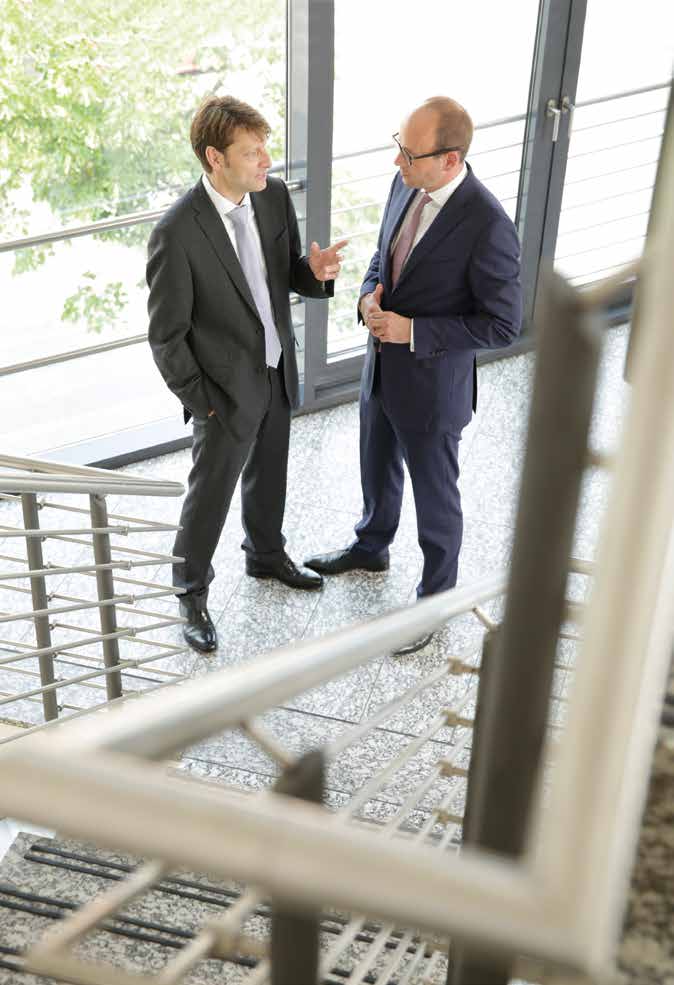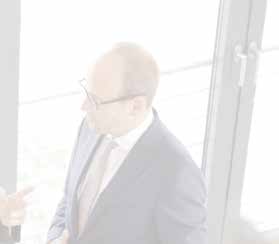Skwschwarz.de




Magnus Hirsch, Markus von Fuchs and Margret Knitter
SKW Schwarz Rechtsanwälte
Trademarks
A Global Guide




SKW Schwarz:
independent and business-minded
The Law Firm
Areas of Work
SKW Schwarz is an independent German law firm.
Banking and Finance
We advise companies of all sizes ranging from owner-
Commercial and Distribution
managed firms to listed corporations as well as private
Corporate / M & A
clients in all major areas of national and international commercial law. With offices in Berlin, Dusseldorf,
Frankfurt/Main, Hamburg and Munich, we are present
Insolvency / Restructuring
at major German business centers.
IP / Competition Law
With more than 100 lawyers, we regard ourselves as a mediumsized firm, which can yet take on international
IT & Digital Business
assignments that are usually the domain of large
Litigation / Arbitration / Mediation
law firms. Our cooperation procedures across office
Media and Entertainment
locations enable us to set up teams for more complex
transactions which are comparable to those ofconsiderably larger competitors. Furthermore, our
membership in international law firm associations and
our cooperation with selected partner firms ensure that
we can offer our clients excellent support around the
world at any time.
SKW Schwarz is a firm which combines tradition and cutting edge service standards. Some of our offices have existed for several decades. Many of our client relationships have been in place for years – a clear example of the importance we attach to stability.
www.skwschwarz.de
Berlin Düsseldorf Frankfurt / Main Hamburg München
SKW Schwarz:
independent and business-minded
SKW Schwarz Rechtsanwälte
The Law Firm
Areas of Work
SKW Schwarz is an independent German law firm.
Banking and Finance
We advise companies of all sizes ranging from owner-
Commercial and Distribution
managed firms to listed corporations as well as private
Corporate / M & A
clients in all major areas of national and international commercial law. With offices in Berlin, Dusseldorf,
Frankfurt/Main, Hamburg and Munich, we are present
Insolvency / Restructuring
at major German business centers.
IP / Competition Law
With more than 100 lawyers, we regard ourselves as
Magnus Hirsch, Markus von Fuchs and Margret Knitter
a mediumsized firm, which can yet take on international
IT & Digital Business
assignments that are usually the domain of large
Litigation / Arbitration / Mediation
Selection, clearance and registration
influence how a pharmaceutical product
By law, a company can market a pharmaceutical
or active substance is evaluated in order to
law firms. Our cooperation procedures across office
Media and Entertainment
product only once it has received marketing
mislead consumers regarding its quality
locations enable us to set up teams for more complex
authorisation. Marketing authorisation
(Section 8 of the Medicinal Products Act).
transactions which are comparable to those of
can be obtained through either a national
application made in Germany or a centralised
The Community codes for
considerably larger competitors. Furthermore, our
application for all EU member states and the
pharmaceuticals for human use are set out
membership in international law firm associations and
European Economic Area countries (ie, Iceland,
in the EU Medicinal Products Directive
our cooperation with selected partner firms ensure that
Liechtenstein and Norway).
(2001/83/EC), which has been transposed
The competent authorities in Germany are into the Medicinal Products Act. They
we can offer our clients excellent support around the
the Federal Institute for Drugs and Medical
provide the legal framework for the
world at any time.
Devices (BfArM) and the Paul Ehrlich Institute authorisation, manufacture and distribution
(PEI). The authorisation process is outlined
of pharmaceuticals in the European Union.
in the Medicinal Products Act. Medicinal
The name of the pharmaceutical may be
SKW Schwarz is a firm which combines tradition and
products or active substances with misleading an invented name which is unlikely to be
cutting edge service standards. Some of our offices
names, descriptions or appearances cannot
confused with a common name, a common or
be manufactured or placed on the market. In
scientific name accompanied by a trademark
have existed for several decades. Many of our client
particular, the following are considered to be
or the name of the marketing authorisation
relationships have been in place for years – a clear
holder (Article 1(20) of the directive). The
example of the importance we attach to stability.
• disingenuous claims regarding the
directive defines a ‘common name' as
therapeutic efficacy or effects of certain
the international non-proprietary name
pharmaceuticals or active substances;
(INN) recommended by the World Health
• the false impression that a successful
Organisation or, if one does not exist, the
outcome is certain or that no harmful
usual common name.
effects will occur when the pharmaceutical
Marketing authorisations for
product is used for its intended purpose or
pharmaceutical products are limited to
for a prolonged period; and
five years, but can be extended by filing
• names, descriptions or appearances that
an application to BfArM or PEI. Further,
Berlin Düsseldorf Frankfurt / Main Hamburg München
www.WorldTrademarkReview.com
Pharmaceutical Trademarks 2015/2016 55
GERMANY SKW SCHWARZ RECHTSANWÄLTE
SKW SCHWARZ RECHTSANWÄLTE GERMANY
marketing authorisation can be obtained
The German Patent Court rejected the
from the European Medicines Agency
likelihood of confusion between the marks
(EMA). Under a centralised procedure,
PANTOPREM and PANTOPAN (MEDA Pharma
pharmaceutical companies submit a single
GmbH & Co KG v Takeda GmbH, 25 W (pat)
marketing authorisation application to
72/12). The court acknowledged that the
the EMA. Once granted by the European
opening syllables of the opposing mark (‘panto')
Commission, a centralised marketing
referred to the active ingredient pantoprazol
authorisation has EU-wide effect. The
– a proton pump inhibitor used particularly
centralised authorisation procedure is based
in gastrointestinal preparations – and that the
on EU Regulation 726/2004.
relevant public would recognise this. Therefore,
it had to be presumed that attention would have
Confusion with INNs
focused on the additional word components or
Trademarks in the pharmaceutical sector are
endings rather than the beginning of the marks.
commonly created from descriptive terms,
However, the differences between the compared
especially from INNs. One advantage of such
marks would not have gone unnoticed in the
trademarks is the link they create for patients
overall aural and typographical impressions.
between the pharmaceutical product and
its application. However, INNs are excluded
Parallel imports and repackaging
from trademark protection because they are
While parallel imports from outside the
merely descriptive and thus are indistinctive.
European Union clearly violate trademark
However, under German law small changes
law and can easily be prevented by civil and
to the INN can make it a registrable sign –
customs actions, especially as the burden of
for example, ROXIMYCIN was accepted as a
proof generally rests with the infringer, parallel
trademark, while the INN was Roxythromycin. imports within the European Union can also
Further, such trademarks have a limited scope be prevented under certain circumstances.
of protection under German law. According
In line with trademark law, it is essential that
to settled case law, the greater the distinctive
brand recognition, origin and the guarantee of
character of the prior trademark, the greater
the trademark are maintained. However, it is
the likelihood of confusion. This means that
equally important to guarantee repackaging for
trademarks inspired by descriptive elements
the importer. Otherwise, general enforcement
have a limited scope of protection.
by the rights holder would lead to market
foreclosure. Thus, the European Court of Justice
and the German Federal Court of Justice have
established the following requirements, which
must be fulfilled simultaneously:
• The reliance on trademark rights by the
According to settled
rights holder contributes to the artificial
partitioning of markets between member
case law, the greater the
• Repackaging does not affect the original
distinctive character of
condition of the product inside the
the prior trademark, the
• The new packaging clearly states who
greater the likelihood of
repackaged the product and the name of
the manufacturer.
confusion. This means
• The presentation of the repackaged
that trademarks inspired
product is not liable to damage the
reputation of the trademark or the rights
by descriptive elements
• The importer notifies the rights holder
have a limited scope of
before the repackaged product is put on sale
and supplies it with a sample on demand.
56 Pharmaceutical Trademarks 2015/2016
www.WorldTrademarkReview.com
SKW SCHWARZ RECHTSANWÄLTE GERMANY
Pharmacists are required to dispense generic
pharmaceuticals in cases where the panel physician has
prescribed a pharmaceutical product using its active
substance name only or has not ruled out replacing the
pharmaceutical product with an alternative
The Federal Court of Justice recently dealt
the relevant market. As the distribution of
with the first of these requirements (Micardis,
30-tablet packets imported from France was
I ZR 99/12). The court addressed the question
prohibited in the 100-tablet packet sub-market,
of whether market foreclosure occurred when
they needed to be repackaged in 100-tablet
the defendant was denied permission to
packets; therefore, repackaging was permitted.
import pharmaceutical tablets from Romania
However, if the importer can use the
and England into Germany and repackage
original packaging, by attaching new labels
them. In Romania and England, a 28-tablet
and adding more blister packs, there may be
packet was standard, compared to a standard
no need to repackage. In the present case, it
98-tablet packet in Germany. Further, in
was held that the importer could add more
England and Romania 98-tablet packets
blister packs to change the packet size from 28
were unavailable. The court held that market
tablets to 56 tablets and then repackage. The
foreclosure occurs once the parallel importer
importer always bears the burden of proving
is forced to repackage the tablets due to
the need to repackage.
objective circumstances. These circumstances
are satisfied as soon as the importer is unable
Anti-counterfeiting and enforcement
to meet the demands of the importing member The damage caused by counterfeit
state. Thus, market foreclosure occurs once
pharmaceutical products is a major issue
the importer is excluded from a sub-market
in the European Union and Germany. Most
(eg, the 98-tablet packet market). Further, the
counterfeit products arrive in Germany from
court stated that the exclusion did not depend
non-EU member states. Regarding non-EU
on whether it was possible in principle to
goods, Customs can act on the basis of EU
distribute the packaging size unchanged.
Regulation 608/2013. The application of the
The Federal Court of Justice dealt with
regulation may be limited to customs action at
a further issue, as the defendant wanted to
the German border or to action in two or more
import tablets from France to Germany. In
member states (national or EU applications).
France, the relevant tablets were available in
When suspect goods are detected at the
30-tablet and 100-tablet packets, whereas in
border, the German customs authorities
Germany a 100-tablet packet was standard. It
will seize them, notify the declarant of
was questionable whether the importer could
their detention and allow the declarant 10
be allowed to import the 100-tablet packets
working days to consent or object to their
from France without repackaging the 30-tablet
abandonment for destruction. Customs will
packets. The court held that the importer could also notify the rights holder and disclose
not use only the 100-tablet packets. The test
information on the shipment and the
for exhaustion and necessity of repackaging
parties involved. Goods are considered to be
was whether the specific imports needed
abandoned for destruction when the rights
to be repackaged in order to be traded on
holder confirms that they infringe an IP right
www.WorldTrademarkReview.com
Pharmaceutical Trademarks 2015/2016 57
GERMANY SKW SCHWARZ RECHTSANWÄLTE
SKW SCHWARZ RECHTSANWÄLTE GERMANY
and requests their destruction, unless the
declarant objects within the 10-day period.
• the means of transport and identity of the
If the declarant objects to the detention, the
carrier involved; and
rights holder has 10 working days to initiate
• the country or countries of production and
infringement proceedings. Otherwise,
the routes used by traffickers.
Customs will release the goods.
When filing an application, it is advisable
Advertising
to submit as much information as possible to
The Act Against Unfair Competition and the
enable Customs to analyse and assess the risk
regulations of the Medications Advertising Act
of an IP infringement, such as:
about product-related ads for pharmaceutical
• the port or country from which the goods
products apply to the advertising of
were consigned and their intended port of
pharmaceutical products. While prescription
arrival in the European Union or Germany; pharmaceuticals can be advertised to experts
• details identifying the consignment or
only (eg, physicians, pharmacists and
Markus von Fuchs
Magnus Hirsch advises and represents
Markus von Fuchs is a partner in SKW
national and international clients in all
Schwarz's Berlin office. His client portfolio
IP-related matters. He is a certified IP
comprises some of Germany's leading
specialist and a frequently recommended
companies in the medical devices industry,
IP lawyer in Germany who was recently
the healthcare sector and several other
named one of Germany's Best IP
fields of healthcare-related technology.
Lawyers for 2014. He is a member of the
Since 2005, Dr von Fuchs has been legal
International Trademark Association, the
counsel for Spectaris, a German industry
Pharmaceutical Trademarks Group and the
association for the medical device
Intellectual Property Rights and Copyrights
industry. In particular, he advises on the
Association. Dr Hirsch is chief editor of
enforcement of IP rights, R&D agreements,
TerraLex's global IP Newsletter and its
all matters deriving from German Medical
global IP chair. He joined SKW Schwarz in
Devices Law and the Medicinal Products
2007, previously practising as a lawyer and
Advertising Act, as well as compliance
partner at Baker & McKenzie in Frankfurt
matters and regulatory affairs. Dr von
and Hong Kong from 2001 to 2007. After
Fuchs is a member of the firm's life science
graduating from the University of Passau,
practice group and head of the IP and
Dr Hirsch practised with Lovells in
competition group.
Frankfurt and Hamburg from 1997 to 2001.
58 Pharmaceutical Trademarks 2015/2016
www.WorldTrademarkReview.com
SKW SCHWARZ RECHTSANWÄLTE GERMANY
hospitals), non-prescription pharmaceuticals
‘Reminder' advertising is when only the name
can be advertised to consumers.
of the pharmaceutical product, the brand or
The Medications Advertising Act lists
the name of the manufacturer is advertised,
mandatory information to be included in
without any medical or health information.
pharmaceutical product ads, such as areas of
Generally, health-related information is
application, side effects and warnings, which
permitted only if it is accurate, unambiguous and
must match the package inserts prescribed
clear. False advertising with efficacy information
in the Medicinal Products Act. In terms of
is prohibited and ads featuring efficacy
content, such mandatory information must
information that is insufficiently documented
be clearly separate from other advertising
or disputed by conventional medicine are also
messages; a distinction is made regarding the
prohibited. Only efficacy information that has
type of ad (eg, television or a display device).
been the subject of pharmaceutical approval
In cases of reminder advertising, significantly
can be advertised. Even under these restrictive
less mandatory information must be provided. conditions, it is possible to advertise modes
of action that were not the subject of the
approval procedure, but there are particularly
strict requirements for scientific proof of such
modes. Government agencies need not examine
and approve ads for pharmaceuticals before
publication; instead, manufacturers must ensure
that their ads conform with the law.
However, ads featuring efficacy information
are frequently the subject of legal dispute. This
is because (allegedly) incorrect information
not only is monitored and controlled by
government supervisory authorities such
as BfArM, but can also be challenged by
competitors or consumer associations
under Section 4/11 of the Act Against Unfair
Competition. Accordingly, violations of market
[email protected]
behaviour rules in the competition process can
be pursued by the private sector. Section 3 of the
Margret Knitter is a partner at SKW
Medications Advertising Act – which governs
Schwarz's Munich office, specialising in
the prerequisites of permissible ads featuring
the fields of trademark law, design law
efficacy information – is regarded as such a
and unfair competition law. She advises
market behaviour rule. Consequently, efficacy
her clients on the global administration,
information in Germany is closely monitored.
protection, enforcement of trademarks
and designs and on structuring and
Moreover, pharmaceutical ads must be
developing their IP portfolios. In addition,
factual and should induce no unnecessary or
she advises on anti-counterfeiting,
irrational uses. The Medications Advertising
licensing and merchandising issues and
Act lists impermissible types of ad (eg, those
provides transactional support. Ms Knitter
using case histories, offering prizes or issuing
represents an international clientele
ranging from industrial to mid-sized
A violation of the Medications Advertising
companies. She has special expertise in the
pharmaceutical, chemical, crop science,
Act not only leads to the prohibition of
confectionery, publishing, IT consulting,
such ad, but may also result in one year's
toy, clothing, mechanical engineering
imprisonment for misleading advertising or
and luxury goods sectors. She has been a
fines of up to €50,000 for other violations.
lecturer at the University of Liechtenstein
since 2013 and is a member of the
Pharmaceutical Trademarks Group.
The cost explosion in the German health
system has prompted the legislature and
www.WorldTrademarkReview.com
Pharmaceutical Trademarks 2015/2016 59
GERMANY SKW SCHWARZ RECHTSANWÄLTE
SKW SCHWARZ RECHTSANWÄLTE GERMANY
German law generally allows the mail order
sale of pharmaceuticals, including prescription
pharmaceuticals, if the pharmacy has obtained the
relevant permission
health insurers to promote the prescription of
required to dispense generic pharmaceuticals
generic pharmaceuticals by physicians and/or
in cases where the panel physician has
the dispensation of generic pharmaceuticals
prescribed a pharmaceutical product using its
by pharmacies as a tool for reducing costs.
active substance name only or has not ruled
As an innovative compound, a generic
out replacing the pharmaceutical product
pharmaceutical must be approved
with an alternative with the same active
initially. This is done through a simplified
substance. As a prerequisite, the generic
procedure. The manufacturer of the
pharmaceutical must contain the same active
generic pharmaceutical must provide a
substance at an identical strength and in the
bioequivalence document with the full
same or an interchangeable dosage form.
clinical documentation of the innovative
compound. This condition is satisfied if the
generic pharmaceutical is equivalent to the
German law generally allows the mail
innovative compound, exhibits adequate
order sale of pharmaceuticals, including
pharmaceutical quality and, in applications
prescription pharmaceuticals, if the pharmacy
for humans, exhibits bioequivalent properties.
has obtained the relevant permission.
An approved generic pharmaceutical
In addition, pharmacies are subject to
that is identical to the active substance
German price setting no matter whether
can be prescribed by physicians instead
the pharmaceuticals are sold by a German
of the innovative compound if it features
pharmacy or a foreign pharmacy (Section
comparable biopharmaceutical properties, as
78/I/4 of the Medicinal Products Act). A
it is then regarded as a therapeutic equivalent. breach of the price-setting policy does not
This criterion is examined by determining
necessarily require a lower price, but is
plasma concentration-time profiles and
assumed if the pharmacist grants a discount
pharmacokinetic evaluations. Dosage
with vouchers or similar.
form, indication and properties related to
In 2014 the Federal Court of Justice
the active substance can also play a role in
dealt with a case in which German
the evaluation. Appropriate information is
pharmacies tried to circumvent German
provided in the appendix of the Medicinal
price setting by advertising pharmaceutical
Products Directive entitled "Information on
products from pharmacies located in the
the Interchangeability of Dosage Forms".
Netherlands (Holland-Preise, I ZR 77/09).
Pharmacists issuing generic
The pharmacy offered customers the chance
pharmaceuticals must follow the principles of
to pay the cheaper Dutch price as the order
the Framework Agreement on the Provision
was addressed to a German pharmacy.
of Medicinal Products between the National
Customers would merely collect their
Association of Statutory Health Insurance
ordered pharmaceuticals from the German
Funds and the German Association of
pharmacy or in the Netherlands. When
Pharmacists. Accordingly, pharmacists are
choosing to collect the pharmaceuticals
60 Pharmaceutical Trademarks 2015/2016
www.WorldTrademarkReview.com
SKW SCHWARZ RECHTSANWÄLTE GERMANY
in Germany, customers had to pay a fixed
• protection from fraudulent use of payment
rate for transportation. Further, the general
terms and conditions stated that the place of
• invalidity of any waiver of such rights and
performance should be the place of business
obligations, whether instigated by the
(ie, the Netherlands). The court ruled that the
consumer or the supplier.
German price applied in such cases where
German legislation was circumvented.
If pharmaceuticals are sold over the
Internet, the provisions on distance selling
apply, especially the requirement to provide
comprehensive information before purchase
and confirm such information in a durable
medium (eg, in writing), and the consumer's
right to cancel the contract within a minimum
of seven working days without reason and
without penalty, except the cost of returning
the goods (the right of withdrawal). Additional
provisions pertain to:
SKW Schwarz Rechtsanwälte
• the right to a refund within 30 days of the
Mörfelder Landstraße 117
consumer cancelling the contract;
D - 60598 Frankfurt/Main
• the delivery of goods or performance of
service within 30 days of the consumer
Tel +49 69 6300 010
placing the order;
• protection from unsolicited selling;
www.WorldTrademarkReview.com
Pharmaceutical Trademarks 2015/2016 61
Source: http://www.skwschwarz.de/files/skw_schwarz_beitrag_germany_in_pharmaceutical_trademarks_2015_2016.pdf
Time to Register for Religious Educa- tion Classes for 2008/09 - R.E. Classes forGrades 1 - 6 will meet on Tuesday, Wednesday, and July 26 - August 3 Thursday afternoons from 3:45 - 4:45 PM. Grades 7& 8 will meet on Thursdays from 6 - 7 PM with 7th Seventeenth Sunday of Ordinary Time and 8th Grade Youth Group to follow from 7- 8:30
Journal of Adult Development, Vol. 12, Nos. 2/3, August 2005 ( C Neurofeedback Treatment of Depression and Anxiety D. Corydon Hammond1,2 A robust body of research documents that there are biological predispositions that oftenexist for depression, anxiety, and obsessive–compulsive disorder. However, new researchhas shown that medication is only mildly more effective than placebo in the treatment ofthese problems. In treating these conditions, neurofeedback (EEG biofeedback) may offer analternative to invasive treatments such as medication, ECT, and intense levels of transcrancialmagnetic stimulation. This paper reviews the neurofeedback literature with these problems,finding particularly positive research support for the treatment of anxiety disorders. Newfindings on the neurofeedback treatment of depression are presented.















